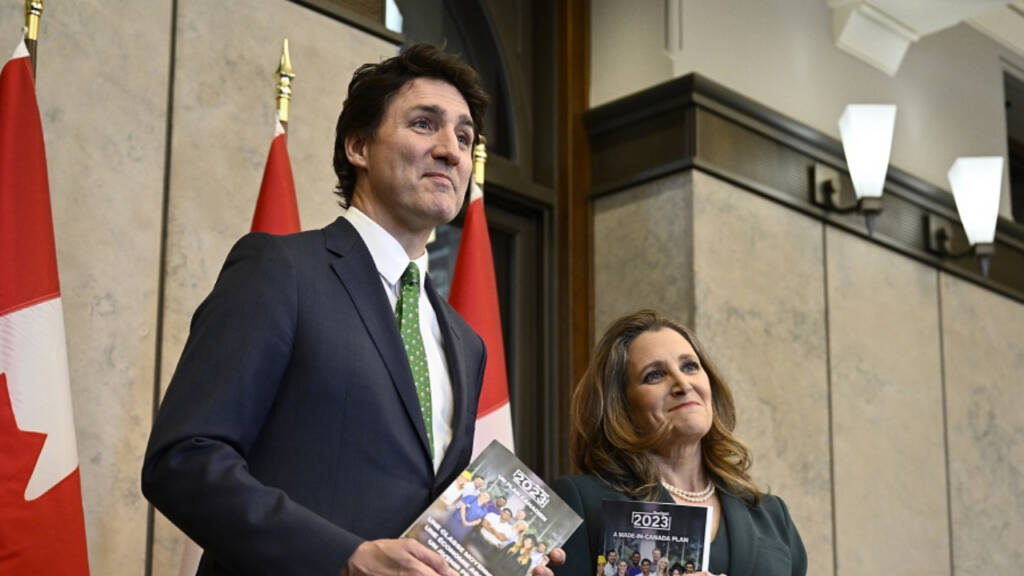Canada Budge 2023: Recently, the Liberal Government in Canada announced its federal budget. In the Canada Budge 2023, Finance Minister Chrystia Freeland has abandoned the Liberal government’s pledge to return the federal budget to balance.
Instead, the budget has forced years of further deficits as the Finance Minister made bigger spending plans to transform the economy to use less carbon.
Last fall, she predicted that after years of sky–high, pandemic–driven deficits, the government would finally return to balance, gradually reducing deficits until moving into a $4.5 billion surplus in 2027. That previous projection has now been dropped and replaced with a $14–billion deficit.
Canada Budge 2023: The important points
Across all of the next five years, the deficits are also larger than previously estimated, with the government ending this coming year with $43 billion in the red compared to an estimated $36.4 billion just a few months ago. In total, Canada’s debt will climb by over $50 billion in the years ahead. Freeland also dropped previous Liberal promises to keep the debt–to–GDP ratio declining as a “fiscal anchor,” as it rises this year to 43 per cent. Over the next five years, the government will spend an additional $22 billion on health care as part of a deal with the provinces announced last month.
They’re also adding roughly $7 billion to pay for an expanded dental care program which is part of the confidence and supply agreement with the NDP. The government is also providing an extra GST credit for low–income Canadians, at a cost of $2.5 billion, to help with the rising cost of groceries, as inflation continues to surge. In other words, the government would continue with its previous policy of massive spending.
Read More: Trudeau chooses the most environment unfriendly hotel in Egypt to attend an environment summit
Moreover, the liberals have also announced a plan for tax-free savings accounts to somehow help Canadians manage inflation. To tell you the truth, Justin Trudeau’s reckless spending will spell distress for millions of poor Canadians.
In recent years, the Canadian government has increased its spending to address various social and economic issues in the country. This includes investments in infrastructure, healthcare, education, and social programs. To be clear, the government‘s spending is unsustainable, is based on unsound economic policies and could lead to long–term economic damage. The Canadian government in the Canada Budge 2023 is spending beyond its means. The country‘s national debt has increased significantly in recent years, and the budget deficit is projected to reach a record high in the coming years. This has led to concerns about the government‘s ability to pay off its debt and maintain its fiscal stability.
In the span of only a few years, the nation‘s debt has doubled to $1.2 trillion from around 685 billion in 2019. Justin Trudeau, the “les terribles” of Canadian politics, runs the risk of sinking the economy and jeopardizing the lives of millions of people with this kind of careless spending. And make no mistake, the government‘s spending is driven by political considerations rather than sound economic policy.
Why it’s a trap
Justin Trudeau has been spending poor Canadians’ money to gain political favour and win votes rather than investing in projects that would have long–term economic benefits for the country. Politicians like Trudeau often use the promise of freebies and other benefits to appeal to voters and win their support. This is because these types of promises can be highly effective in generating enthusiasm among voters, particularly those who may be struggling economically or facing other challenges. One reason that the use of freebies is so prevalent in the Trudeau government is that they can be a quick and easy way to generate positive feelings among Canadian voters, who are facing myriad difficulties.
Read More: The Shady Plan of Han Dong: How He Duped Canadians to Keep Conservatives Down
For example, a promise to provide free healthcare or education can be appealing to many people, as it suggests that the government is taking concrete steps to address their needs and improve their lives. Besides, they can help create a sense of loyalty and gratitude among voters. When a politician provides a free service or benefit, it can create a sense of obligation or indebtedness among voters, who may be more likely to support that politician in future elections or other political activities. In the long run, this type of short–term thinking can, however, lead to serious economic consequences.
It is important to understand that excessive government spending can lead to inflation, a weakened currency, and a lack of investment in critical infrastructure and industries. This can harm the country‘s economic growth and long–term competitiveness. Moreover, freebies are used as a distraction by the Liberal government from other important political issues or challenges. By focusing solely on providing free services or benefits, Trudeau is neglecting other important issues such as economic growth, and socioeconomic equality. Therefore, Canadians should be wary of the government‘s spending and consider the long–term consequences of short–term freebies.
While it may be tempting to accept immediate benefits, such as free healthcare or education, Canadians should also consider the impact of this spending on the country‘s long–term economic health and national interests. Freeland‘s cunning budget has the potential to turn nay–sayers into Trudeau loyalists. The combination of tax cuts, infrastructure investments and social programs could be enough to convince those who were previously sceptical of the Trudeau government to become supporters. However, the long–term economic effects of this spending must still be taken into account. Canadians must remember that the government‘s spending can have serious consequences and that they must be aware of the potential risks.
https://www.youtube.com/watch?v=nQQDP9qVlKc
